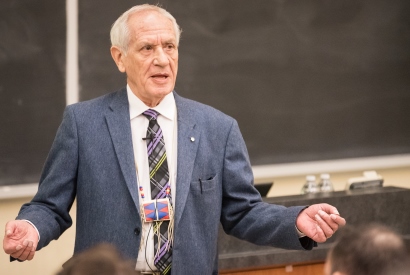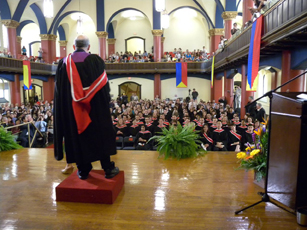A degree of inspiration
November 27, 2017
Share
If you’ve ever wanted to meet a hero, or share a world-changing leader’s insights with the Queen’s community, you may want to consider nominating someone for an honorary degree at Queen’s.
Honorary degrees are one of the most prestigious awards given by a university. Recipients are nominated by the university community based on their contribution to the university, the local community, Canadian society, and to the world.
Bill Flanagan, Dean of Law, recounts his recent experience nominating Douglas Cardinal, a prominent Indigenous architect, Order of Canada inductee, and leader in the Indigenous community.

“Douglas has had a long and distinguished career, and he’s been a great friend of the school. He’s come to speak to our students about Indigenous legal matters, and gave two lectures while he was in Kingston for the convocation about Indigenous peoples and law in Canada. He has created award-winning and world-renowned buildings, such as the Museum of Civilization in Ottawa and a church in Red Deer, Alberta – a famous building which I attended as a kid, and I was always terribly impressed by its beauty,” he says.
“Nominating honorary degree recipients is of great value, both to recognize their contributions and also as an opportunity to provide inspiration to our graduates,” says Dean Flanagan. “It’s important that these nominees are considered carefully, and be of a certain caliber, like Douglas Cardinal, who has been a tremendous leader in his field.”
The Senate Honorary Degree Committee approves nominees from the applications, and may award a Doctor of Divinity, Laws, or Science to the successful recipients.
Richard Reznick, Dean of Health Sciences, has nominated many honorary degree recipients over the years, and recounts one of his most memorable.

“The very first recipient that I nominated was Dr. Izzeldin Abuelaish. He is a Canadian-Palestinian doctor who lived in Palestine but trained in Israel as an obstetrician, and had a lot of connections in the Israeli community. During one of the severe conflicts, where there were a lot of bombings, he had a tragedy that killed three of his children, his niece, and injured another child. He became world-famous for writing a book, I Shall Not Hate, which promoted using conflict and tragedy to foster understanding between sides on serious – in this case, thousands of years long – conflicts,” says Dr. Reznick. “When he gave his convocation speech, not only did he get a standing ovation, but he had everyone in tears.”
Both Deans would recommend the experience to anyone in the Queen’s community.
“I’ve made it a habit to nominate someone every year,” says Dr. Reznick. “It’s really about honouring the nominee, and inspiring our students, but it also gives Queen’s a chance to affiliate with these world-famous people, and create a connection.”
“Of course,” says Dean Flanagan. “For my nomination of Douglas, I wanted to both recognize and thank him for his contribution to our school, speaking to our students, participating in our Indigenous art project, and providing a voice for Indigenous people in the law school.”
You don’t have to be a Dean to nominate someone for an honorary degree. Anyone from the Kingston or Queen’s community may nominate a person they believe has made remarkable contributions to the lives of others throughout the world, in academia, business, politics, scientific research, and the arts.
The committee invites nominations for honorary degrees to all who qualify, including women, Aboriginal persons, visible minorities/racialized persons, persons with disabilities, and LGBTQ persons.
The selection process begins after all nominations are submitted, when the committee meets to review the nominations and make recommendations. The Senate then approves the recommendations in April, and invitations to candidates for both the fall and winter convocations are sent over the summer. In fall, the list of honorees are made public.
Applications are open through the University Secretariat to nominate an individual or group for an honorary degree for fall and winter of 2019. The deadline is March 1, 2018 to submit nomination forms.